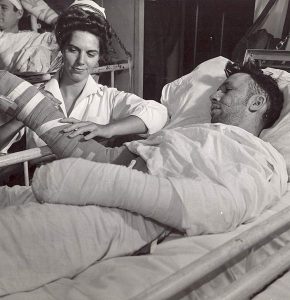U.S. Senators Barbara Boxer (D-CA) and Sherrod Brown (D-OH) joined Representative Jan Schakowsky (D-IL) today to introduce the National Nursing Shortage Reform and Patient Advocacy Act, legislation that would establish minimum registered nurse-to-patient ratios in hospitals, protect the rights of nurses to advocate on behalf of their patients and invest in training and retaining nurses to address the nationwide nursing shortage.

“I am proud to introduce this bill to help save the lives of countless patients by improving the quality of care in our nation’s hospitals,” Senator Boxer said. “We must support the hard-working nurses who strive to provide the best possible care to their patients every single day.”
Senator Brown said, “With an aging population in Ohio and across the nation, nurses are more important than ever – which is why it’s so important to invest in our nurses and give them the support they deserve. This legislation would protect nurses who speak up to report violations and will improve patient care by investing in training and establishing minimum nurse-to-patient ratios. Our nurses are a source of medical care and emotional support for patients, and they deserve these protections so they can keep up that important work.”
“Nurses are essential for quality care and patient safety,” Representative Schakowsky said. “Patients know – and study after study shows – that having a nurse at the bedside improves medical outcomes while inadequate staffing levels can result in preventable injuries and deaths. I’m proud to join with Senator Boxer on this legislation – to require an adequate number or nurses in hospitals and end the dangerous problem of understaffing.”
The legislation builds on the success of California’s historic law that set minimum nurse-to-patient ratios and extends those minimum standards to hospitals that participate in Medicare and Medicaid.
Specifically, the bill would:
- Establish minimum registered nurse-to-patient ratios that will save lives, improve the quality of care and help to address the nursing shortage by creating a work environment that encourages nurses to remain in the hospital workforce;
- Implement unit level licensed practical nurse staffing requirements to promote quality care and patient safety;
- Provide whistleblower protections to protect the right of nurses to advocate for the safety of patients and report violations of minimum standards of care;
- Invest in nursing mentorship demonstration programs to better prepare nurses for work in a hospital setting.
Senator Boxer and Representative Schakowsky introduced similar legislation in the last Congress, as well as the 111th and 112th Congresses.
The bill is supported by National Nurses United, the California Nurses Association and the American Federation of State, County and Municipal Employees (AFSCME).


I am a Male Registered Nurse. Much of the basic care done for patients in institutional and non-institutional settings is done by Aides and Home Health Aides. The quality of this nursing aide care is fundamental to the physical and emotional well being of the patient. Having registered nurses and/or licensed vocational nurses provide this basic care is wasteful economically and wastes the time of registered nurses and licensed vocational nurses. Such being the case, legislation should be introduced at the national level providing for reasonable work loads, reasonable working conditions, and reasonable educational and testing requirements for aides in general so as to maximize the quality and quantity of basic health care for patients.
I am a Female Registered Nurse, and much of the basic care done for patients in my institution is not done by aides and/or home health aides. I work for an institution where the nurses obtain labs from the patient, perform EKGs, do respiratory treatments, ambulate, and feed if necessary. When registered nurses participate in this basic care they are able to assess their patients up close and personal, skin, mentation and other systems. Nursing is more than passing pills and giving injections.
I still believe that legislation should be introduced providing reasonable work loads, and reasonable working conditions. I work for a government agency who feels that they are above the established ratios, that are the law in California. I work for a governement agency and I personally have contacted the agency responsible for inforcing said laws and receive no assistance. I continue to be amazed when the JACHO and CMS visit and somehow fail to look at or overlook the staffing assignment books, thereby never questioning the actual staffing that occurs. I continue to be amazed by the administration who purposefully understaffs, simply because they can, they have and continue to get away with it. I have to get back to work
I have been a nurse for 42 years and have found the workload increasing and technical skills needed to perform the ever advancement in medicine gets more and more difficult. Pay has remained stagnent (especially in smaller institutions) and cost of benefits increases every year, while benefits in general decrease. Most younger nurses continue their education because they don’t want to be at the bedside and want to earn a living equal to their education and skills. In the future I fear that nurses at the bedside will be very scarce unless pay and benefits reflect the professionals we really are. I find it amazing that my mechanic makes $80 an hour, the appliance repairman makes $120 an hour, they both have less education, and are not required to use every means to save a life. Legislation/ and employers should think about that. Maybe when they are in the hospital without adequate staff.